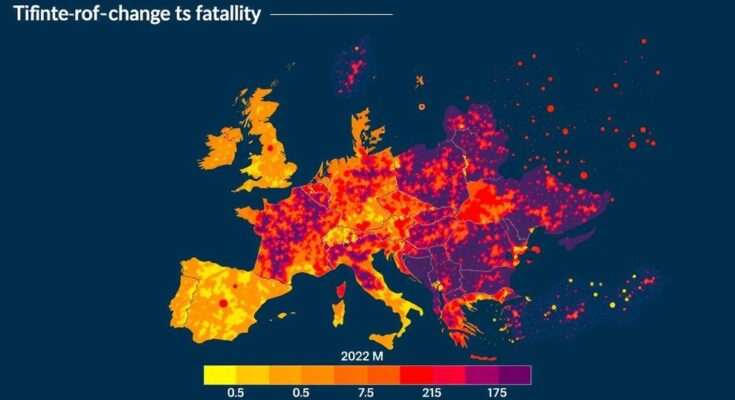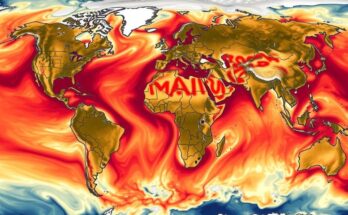A study by the Barcelona Institute for Global Health indicates that climate change was responsible for over half of the 68,000 heat-related deaths during the summer of 2022 in Europe. The research found that approximately 38,000 lives could have been saved if human-induced global warming had not occurred. It highlights demographic disparities in heat mortality and emphasizes the urgent need for public health strategies to address the risks posed by rising temperatures.
A recent study conducted by researchers at the Barcelona Institute for Global Health reveals that the climate crisis was responsible for more than half of the estimated 68,000 heat-related deaths during the unusually hot European summer of 2022. According to their findings, approximately 38,000 of these fatalities could have been prevented had it not been for human-induced greenhouse gas emissions. This staggering figure represents a death toll roughly tenfold that of homicides in Europe for the same year. Lead author Thessa Beck emphasized the urgency of the issue, stating, “Many see climate change as a future concern. Yet our findings underscore that it is already a pressing issue.” The study further indicated that the demographic most affected included women, southern Europeans, and the elderly. While it was known that carbon emissions exacerbated heatwaves, this research quantified their impact on mortality rates, estimating that 56% of heat-related deaths could have been averted without the global warming effects generated by fossil fuel combustion and habitat degradation. The research highlights how even small increases in temperature have the potential to significantly impact public health. Emily Theokritoff, a researcher from Imperial College London not involved in the study, noted, “This result makes sense – heat-related death increases rapidly as temperatures push past the limits people are acclimatised to.” At present, Europe is experiencing warming at a rate twice as fast as the global average. However, many hospitals are ill-equipped to address the resultant health challenges. The research predicts that excess mortality during warming summers will exceed lives saved by milder winters if global temperatures rise beyond 2°C over preindustrial levels, a concern underscored by a recent UN environment program report forecasting a potential 3°C increase by the century’s end. The impact of extreme heat on human health could be even more severe in regions such as Africa, Asia, and South America, though data limitations have hampered comprehensive studies in these areas. Beck remarked, “A common misconception is that only extreme temperatures pose a serious risk,” stressing that even modest heat can contribute to heat-related mortality among vulnerable groups. Using health and temperature data from 35 European countries, the researchers successfully estimated the number of additional deaths attributable to high temperatures. Their modeling revealed that climate change accounted for 22,501 heat-related deaths in women and 14,026 in men. Garyfallos Konstantinoudis, a researcher at Imperial College London, who was not part of the study, suggested potential overestimations in heat mortality rates could arise due to advancements in public health infrastructure over time. To mitigate the health risks associated with extreme heat, physicians advise the public to stay hydrated, avoid outdoor activity during peak heat hours, and remain vigilant in caring for older neighbors or relatives living alone. Furthermore, governments can facilitate healthier outcomes by developing proactive heat response plans, enhancing public green spaces, and actively reducing pollution levels. “Heat can be very dangerous for the heart, especially for older people,” Beck concluded, emphasizing the need for immediate action in addressing these climate-related health risks.
The article addresses the severe public health impacts of climate change as evidenced by a study which attributes a significant proportion of heat-related deaths in Europe to the climate crisis. It contextualizes the findings within the broader scope of ongoing global warming and highlights the differential impacts on various demographic groups. The urgency of the situation is magnified by projections regarding future temperature increases and their potential consequences for human health.
The research establishes a critical link between climate change and increased mortality rates during heatwaves, asserting that immediate action is necessary to mitigate these effects. The findings call for heightened awareness of both the acute and chronic impacts of rising temperatures on vulnerable populations, as well as the implementation of holistic strategies to address climate-related public health challenges.
Original Source: www.theguardian.com




